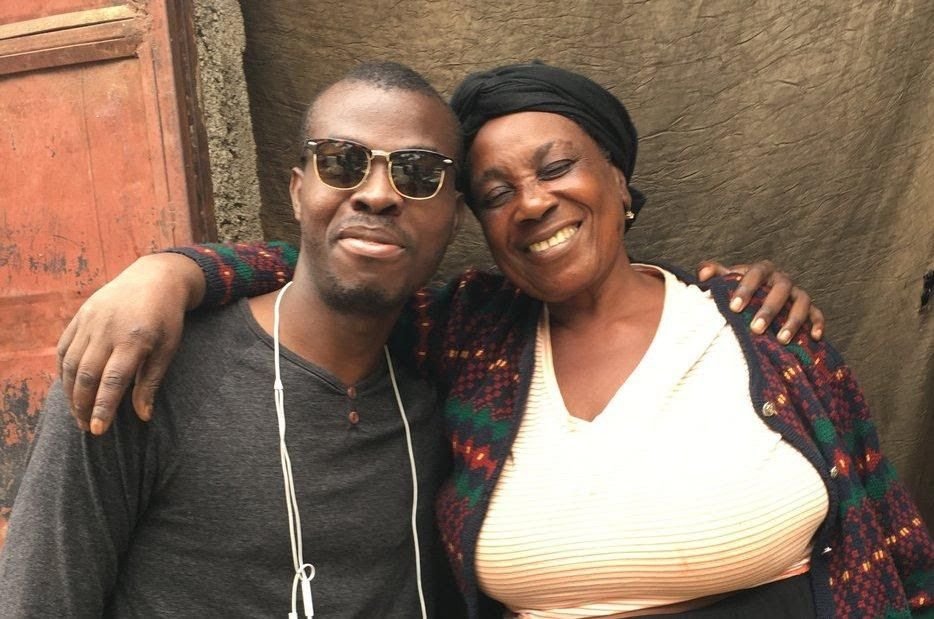“To Tell Our Own Stories”: Etant Dupain on the Powerful Voices of Documentary 'Madan Sara'

// Etant Dupain and Clotide Achille together in November 2018. Image courtesy of Madan Sara Film.
“Listen to Haitian stories from Haitian sources,” Haitian film director Etant Dupain underscored during an interview with WHRB.
Dupain worked for 5 years to create, direct, and produce the documentary movie Madan Sara that premiered in Haiti in October and abroad in November 2020 that tells the stories of Haitian women who are the “engine that runs the economy” of Haiti.
Dupain was a guest of Harvard Radio Broadcasting’s news magazine program As We Know It where he was interviewed by WHRB News reporter Jeromel Dela Rosa Lara, ’23. The Boston area, which is the primary reach of WHRB 95.3 FM has a large Haitian community. Boston is one of the top three destinations of Haitian immigrants to the United States, and Haitian Creole is considered one of the common spoken languages in the city. WHRB hopes this interview and the stories of the Madan Saras would reach the Haitian community where our broadcast can give attention and care to their narratives.
“Madan Sara is a network of women who go from places to places to distribute goods around the country,” Dupain said. “They are primarily bringing food from the countryside to the big cities.”
Dupain’s unscripted film gathers together the voices of the Madan Saras, such as Clotilde Archille and Monique Metellus, and people who like himself were raised by Madan Saras.
“The film is inspired by my experience going to the market with my mom,” Dupain remarked. “This is how the whole thing started in the first place.”
Alongside the voices of the Madan Saras in the movie are the sounds and scenes of the marketplaces as well as the traditional and vibrant Haitian music of Mizik Rasin through the songs of RAM and the Emeline Michel. Everyday the Madan Saras would be selling the medley of fresh produce that they would have obtained and transported from the countryside early in the morning in what often are distant and dangerous journeys. The dependence on the Madan Sara labor network, as the film depicts, is rooted in colonialism and slavery operated by Europe/France. Madan Saras continue to endure, struggle, and fight against gender inequality and a socioeconomic political structure of neoliberalism and capitalism that does not recognize their value.
“Madan Sara is a form of resistance,” Dupain said.
It is a way of life and survival for the women in Haiti. Clotilde Archille, one of the Madan Saras featured in the film, remarked that “Madan Sara is like a school.”
“You have to learn it to do it,” Archille said in the documentary. “If you don’t learn it, you can’t do it.”
The film shows the stories of Madan Saras as the story of Haiti that everyone should care about, including international audiences whose image of Haiti may have only come from non-Haitian, white, Western interlocutors. Dupain invites us all to listen, to recognize, and to fight for the Pouvwa Fanm Ayisyen or the Power of Haitian Women.
The stories of Madan Sara would likely be new and unheard of for non-Haitian audiences especially in the West. Dupain has worked for over a decade in journalism, filmmaking, and community organizing. He has worked for international news media outlets like Al Jazeera, TeleSur, BBC, CNN, Netflix, PBS, and Vice. In the interview, he talked about having fights with producers in his work in international media outlets as he tries to pursue his life work of amplifying Haitian stories and voices. He acknowledges that “you won’t see stories like Madan Sara in the mainstream media.” And he calls to take a stand against this where Haitian narratives can be told and where we can all give our attention to listen to them.
“We can’t allow ‘helicopter media’ to just come to our country and pretend they know our story better, they know our situation better, and they know what to tell about us,” Dupain declares.
For more information on Madan Sara, where to watch the film, and how to support the project:
madansarafilm.com/screenings → offers updated dates, times, and location of public and/or virtual screenings of the film. Madan Sara is not yet available on streaming platforms for individual viewing
madansarafilm.com/donate → to support the Madan Sara film project and to fund free public screenings of the movie
Madan Sara Film Project Social Media:
https://twitter.com/madansarayiti Twitter @madansarayiti
https://www.instagram.com/madansarafilm Instagram @MadanSaraFilm
https://www.facebook.com/MadanSarAyiti Facebook @MadanSarAyiti
For more information on Etant Dupain and his upcoming projects telling Haitian people’s narratives:
https://twitter.com/etantdupain Twitter @EtantDupain
https://www.instagram.com/mr_dupain Instagram @mr_dupain
// Jeromel Dela Rosa Lara, ’23, is a reporter for WHRB News. Follow him on Twitter @jeromellara. The interview with Etant Dupain first aired at 95.3 FM and whrb.org on May 9, 2021. Tune in to "As We Know It" on Sundays at 1:30 p.m. ET for more stories like this one.